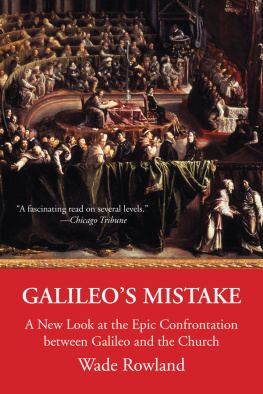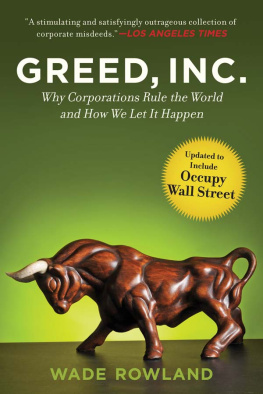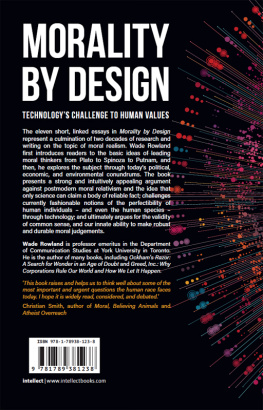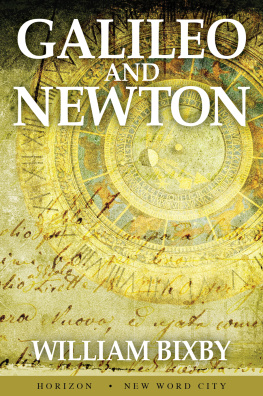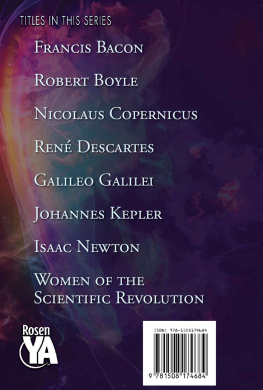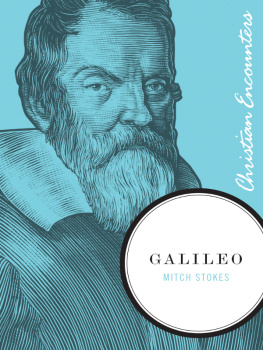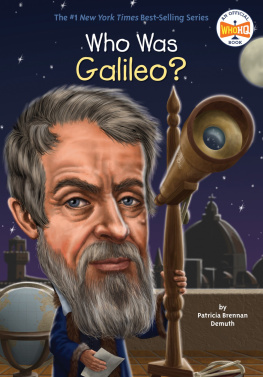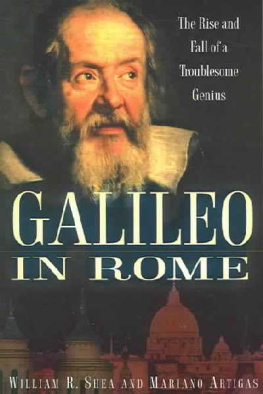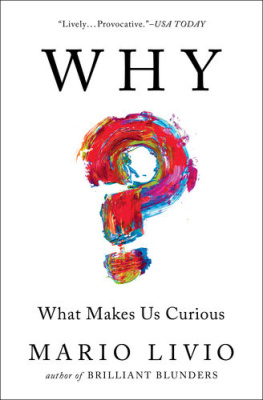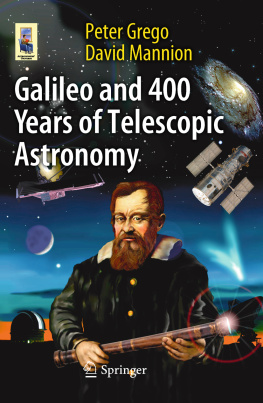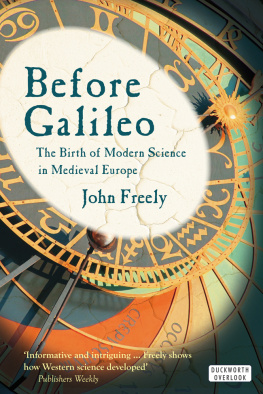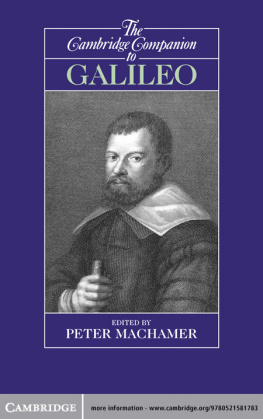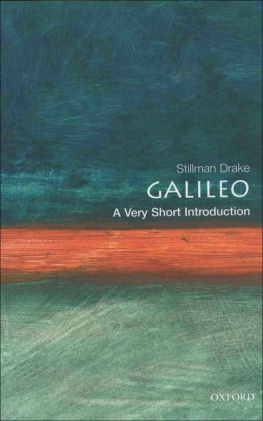Wade Rowland - Galileo’s Mistake: A New Look at the Epic Confrontation between Galileo and the Church
Here you can read online Wade Rowland - Galileo’s Mistake: A New Look at the Epic Confrontation between Galileo and the Church full text of the book (entire story) in english for free. Download pdf and epub, get meaning, cover and reviews about this ebook. year: 2011, publisher: Arcade Publishing, genre: History. Description of the work, (preface) as well as reviews are available. Best literature library LitArk.com created for fans of good reading and offers a wide selection of genres:
Romance novel
Science fiction
Adventure
Detective
Science
History
Home and family
Prose
Art
Politics
Computer
Non-fiction
Religion
Business
Children
Humor
Choose a favorite category and find really read worthwhile books. Enjoy immersion in the world of imagination, feel the emotions of the characters or learn something new for yourself, make an fascinating discovery.
- Book:Galileo’s Mistake: A New Look at the Epic Confrontation between Galileo and the Church
- Author:
- Publisher:Arcade Publishing
- Genre:
- Year:2011
- Rating:3 / 5
- Favourites:Add to favourites
- Your mark:
- 60
- 1
- 2
- 3
- 4
- 5
Galileo’s Mistake: A New Look at the Epic Confrontation between Galileo and the Church: summary, description and annotation
We offer to read an annotation, description, summary or preface (depends on what the author of the book "Galileo’s Mistake: A New Look at the Epic Confrontation between Galileo and the Church" wrote himself). If you haven't found the necessary information about the book — write in the comments, we will try to find it.
Galileo’s Mistake: A New Look at the Epic Confrontation between Galileo and the Church — read online for free the complete book (whole text) full work
Below is the text of the book, divided by pages. System saving the place of the last page read, allows you to conveniently read the book "Galileo’s Mistake: A New Look at the Epic Confrontation between Galileo and the Church" online for free, without having to search again every time where you left off. Put a bookmark, and you can go to the page where you finished reading at any time.
Font size:
Interval:
Bookmark:
I am grateful for the criticism and encouragement of members of the faculty of the graduate program in Methodologies for the Study of Western History and Culture at Trent University in Ontario, especially Professors Andrew Wernick, David Holdsworth, and B. J, Hodgson, and Professor C. V. Boundas, chairman of the universitys department of philosophy Galileo scholar Michael John Gorman was kind enough to share his insights over a wonderful dinner in Rome and in subsequent correspondence.
Thanks to Douglas Rowland, Bruce Powe, Michael Holmes, and Derrick De Kerckhove for reading the manuscript and offering valuable criticism. Alison Reid provided a remarkably thorough copy-edit that improved the text in many ways, and Katja Pantzar gave careful stewardship of the production process. Casey Ebro gave me much thoughtful editing advice for this American edition.
Roberto Benardi and Terry Storms of the Canadian Embassy to the Holy See provided invaluable assistance in arranging various permissions with the Vatican and the Italian government. Caterina Fasella was my very knowledgeable guide through the convent of Santa Maria sopre Minerva, where Galileo was tried by the Inquisition. My son, Simon, gamely trudged many miles with me through the streets and alleys of Rome in search of Galileos world.
Relais et Chateaux in Paris offered their usual exemplary services in arranging accommodation throughout Tuscany during my initial research trip to Italy My thanks in particular to Maryse Masse and Rgis Bulot.
I am deeply indebted to Patrick Crean for his continuing support and enthusiasm for my literary projects.
My wife, Christine Collie Rowland, makes all things possible for me. No finer travel companion could be imagined.

On the Question of Galileos Perjury
Five months after the death of his daughter Sister Maria Celeste in 1633 Galileo grief-stricken, ill, his eyesight failing-wrote a despondent, much-quoted letter to his French supporter Nicolas Peiresc. In it he strangely echoes his fellow Tuscan Niccol Machiavelli, whose famous book of politics, ThePrince, had been published 120 years earlier and dedicated to Lorenzo de Medici, the illustrious ancestor of Galileos patron: I do not hope for any relief, and that is because I have committed no crime. I might hope for and obtain pardon, if I had erred; for it is to faults that the prince can bring indulgence, whereas against one wrongfully sentenced while he was innocent, it is expedient, in order to put up a show of strict lawfulness, to uphold rigor.... Galileo goes on to suggest that the prohibition issued in 1616 had resulted from deceit, before making a cryptic reference to the motives of his enemies:
But how clearly would appear my most holy intention if some power would bring to light the slanders, frauds, stratagems, and trickeries that were used eighteen years ago in Rome in order to deceive the authorities!... You have read my writings, and from them you have certainly understood which was the true and real motive that caused, under the lying mask of religion, this war against me that continually restrains and undercuts me in all directions, so that neither can help come to me from outside nor can I go forth and defend myself, there having been issued an express order to all Inquisitors that they should not allow any of my works to be reprinted which had been printed many years ago or grant permission to any new work that I would print... so that it is left to me only to succumb in silence under the flood of attacks, exposures, derision, and insult coming from all sides.
Those who would argue that Galileos abjuration was sincere have this letter to contend with. Its bald statement, I have committed no crime, has traditionally been taken as evidence for the contention that Galileos abject confession of guilt before the Inquisition was willfully perjured or extorted under threat of torture.
But this has to be weighed in the context of another passage from the same letter, which is less frequently quoted: I have two sources of perpetual comfort, first that in my writings there cannot be found the faintest shadow of irreverence towards the Holy Church; and second, the testimony of my own conscience, which only I and God in Heaven thoroughly know. And He knows that in this cause for which I suffer, though many might have spoken with more learning, none, not even the ancient Fathers, have spoken with more piety or with greater zeal for the Church than I.
Taken together, these quotations give a different meaning to the letter. What Galileo seems to be saying is that he has committed no crime in pursuing his project of trying to convert the Church to the new philosophy of mathematical realismthis cause for which I suffer. It is his dedication to this same cause that is the true and real motive that caused, under the lying mask of religion, this war against me.
But the philosophical issue of Galileos realism versus the Churchs anti-realism did not arise at his trial, which confined itself to the fact of his having disobeyed the 1616 injunction. It was this disobedience, and this alone, that he confessed and abjured. It is the more serious crime of impiety, of trying to undermine the authority of the Church, of which Galileo is declaring his innocence to Peiresc. His motives, he insists, were pure, and he had acted in the best interests of the Church.
This is certainly the most straightforward interpretation of the text, because it avoids both the necessity of conjuring an elaborate and vindictive conspiracy against Galileo within the Church, along with the necessary motive and actors, and the assumption that Galileo committed perjury. That Galileo would lie under oath seems, from everything we know about the man, highly improbable. And the notion that there was a conspiracy against him is to be found mainly in his own letters, and those of admirers reacting to his suspicions and accusations. There is little or no documentary evidence of conspiracyon the contrary, we know that throughout his career he manufactured enemies to suit his rhetorical purposes.
Finally, if the motive imputed by Galileo to his enemies, real or manufactured, is not their wish to derail his philosophical project, what was it? The only possible answer is personal vendetta, and this is the line taken in most histories of the Galileo affair. Usually it is the Jesuit order that is blamed, although sometimes specific persons are named as the malevolent mastermind behind events.
Aside from making the interpretation of the historical record needlessly complicated, this view ignores the fact that the Inquisition process was carefully contrived to weed out exactly this kind of indictment, and it imposed very serious penalties on anyone caught making false accusations. Had Galileo and his supporters seriously believed that a conspiracy was afoot and that he had been falsely accused, one would have expected Galileo or someone else to say so to the Holy Office. But there is no record of any such charge. Once again the documentary evidence favors the simplest explanation.
Further evidence for Galileos sincerity in his abjuration is contained in a much later letter to Francesco Rinuccini (1641) in which Galileo appears to have accepted the arguments put forward by Bellarmine and Urban VIII against his mathematical realism:
To be sure, the conjectures by which Copernicus maintained that the Earth is not at the center are all removed by that most sound argument, taken from the omnipotence of God. He being able to do in many or rather, infinite ways, that which to our view and observation seems to be done in one particular way, we must not pretend to hamper Gods hand and tenaciously maintain that in which we may be mistaken. And, just as I deem inadequate the Copernican observations and [its] conjectures to be insufficient, so I judge equally and more, fallacious and erroneous those of Ptolemy, Aristotle, and their followers when without going beyond the bounds of human reasoning their inconclusiveness can be very easily discovered.
Font size:
Interval:
Bookmark:
Similar books «Galileo’s Mistake: A New Look at the Epic Confrontation between Galileo and the Church»
Look at similar books to Galileo’s Mistake: A New Look at the Epic Confrontation between Galileo and the Church. We have selected literature similar in name and meaning in the hope of providing readers with more options to find new, interesting, not yet read works.
Discussion, reviews of the book Galileo’s Mistake: A New Look at the Epic Confrontation between Galileo and the Church and just readers' own opinions. Leave your comments, write what you think about the work, its meaning or the main characters. Specify what exactly you liked and what you didn't like, and why you think so.

